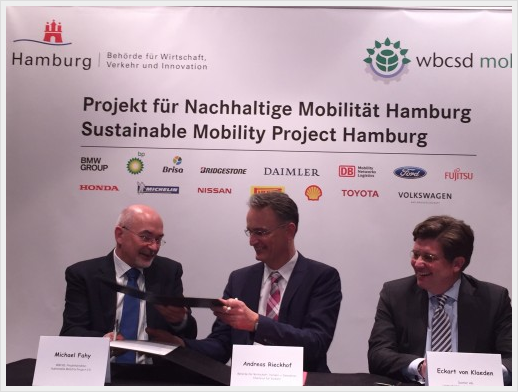
Photo: WBCSD-and-Hamburg
WBCSD and Hamburg form mobility partnership
12 December 2014
by Richard Forster
The city of Hamburg and the World Business Council for Sustainable Development (WBCSD) will work together to develop solutions to achieve a cleaner, safer and better-connected mobility in Hamburg.
“The cooperation with the World Business Council for Sustainable Development and its member companies will generate new thoughts for improving the sustainability of transport in Hamburg,” said Andreas Rieckhof, Hamburg’s Secretary of State for Economy, Transport and Innovation. “We expect the project to provide valuable input for our ongoing process of sustainable urban mobility planning.”
The cooperation is part of the WBCSD’s Sustainable Mobility Project (SMP 2.0), which aims at scaling up latest technologies and traffic management approaches to improve mobility in cities worldwide.
WBCSD has established a city task force with Hamburg’s Department for Economy, Transport and Innovation, which will, at an initial stage, work under the leadership of Daimler along with the participation of BMW, Brisa, Deutsche Bahn, Ford, Fujitsu, Pirelli, Toyota and Volkswagen to analyse Hamburg’s mobility situation in relation to criteria such as environmental compatibility, economic efficiency and quality of life. Based on this analysis, the WBCSD will develop recommendations on how to improve sustainability in Hamburg’s transport system.
“The collaboration between the city of Hamburg and the WBCSD will help the city frame its strategy for sustainable mobility supported by a practical set of solutions,” Michael Fahy, Director of the WBCSD Sustainable Mobility Project (SMP2.0) told Cities Today. “Beyond helping the city in reaching its objectives in sustainability, such as an 80 percent reduction in carbon emissions by 2050, the SMP2.0 will allow Hamburg to become a more attractive place to live and do business.”
The ultimate goal of the SMP2.0 is to accelerate and extend access to safe, reliable and comfortable mobility for all, whilst aiming for affordability, zero traffic accidents, low environmental impacts, and reduced demands on energy and time.
“All member companies including Daimler are highly committed to tackling the challenge of sustainable urban mobility,” said Eckart von Klaeden, Vice President External Affairs for Daimler and leader of the WBCSD’s city task force for Hamburg. “Our aim is to help Hamburg strengthen its role as an innovative mobility centre.”
In 2013, the WBCSD categorised global cities into six clusters according to their mobility characteristics and nominated six cities as pilots to develop a roadmap for sustainable mobility together with city government and related stakeholders. Hamburg was chosen along with Lisbon (Portugal), Campinas (Brazil), Chengdu (China), Indore (India), and Bangkok (Thailand).











